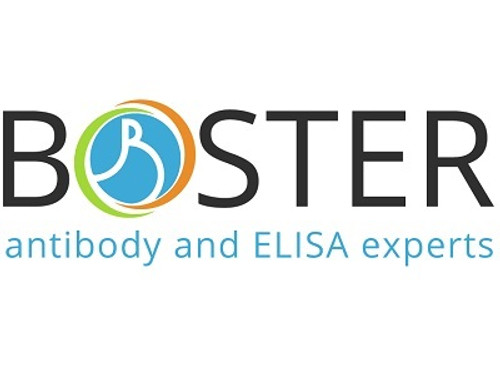Product Description
Human TSC22 domain family protein 3 (TSC22D3) ELISA Kit | AE13172HU | Abebio
Species Reactivity: Human (Homo sapiens)
Abbreviation: TSC22D3
Alternative Name: RP13-364K23.1; DIP; DKFZp313A1123; DSIPI; GILZ; TSC-22R; hDIP; DSIP-immunoreactive leucine zipper protein|OTTHUMP00000023814|TSC-22 related protein|delta sleep inducing peptide; immunoreactor|glucoc
Application: ELISA
Range: 18.52-1500 pg/mL
Sensitivity: 7.15 pg/mL
Intra-Assay: ≤5.2%
Inter-Assay: ≤9.3%
Recovery: 0, 94
Sample Type: Serum, Plasma, Other biological fluids
Detection Method: Sandwich
Analysis Method : Quantitive
Test Principale: This assay employs a two-site sandwich ELISA to quantitate TSC22D3 in samples. An antibody specific for TSC22D3 has been pre-coated onto a microplate. Standards and samples are pipetted into the wells and anyTSC22D3 present is bound by the immobilized antibody. After removing any unbound substances, a biotin-conjugated antibody specific for TSC22D3 is added to the wells. After washing, Streptavidin conjugated Horseradish Peroxidase (HRP) is added to the wells. Following a wash to remove any unbound avidin-enzyme reagent, a substrate solution is added to the wells and color develops in proportion to the amount of TSC22D3 bound in the initial step. The color development is stopped and the intensity of the color is measured.
Product Overview: Delta sleep-inducing peptide, abbreviated DSIP, is a neuropeptide that when infused into the mesodiencephalic ventricle of recipient rabbits induces spindle and delta EEG activity and reduced motor activities. DSIP was discovered by G.Schoeneberger and M.Monnier in 1974; first research aimed at it's somnogenous properties lead to the dubious results. Instead it was demonstrated by the works of different teams that DSIP actually plays a important role in the stress-resistance. DSIP has stress-protective, antiseizure, and immunomodulating effects. It has been demonstrated that DSIP have significant geroprotective effect. K.V. Sudakov views DSIP as one of the 4 main substances, responsible for the stress-resistance of the organism, another 3 being substance P, prolactin and beta-endorphin.
Stability: The stability of ELISA kit is determined by the loss rate of activity. The loss rate of this kit is less than 5% within the expiration date under appropriate storage condition. The loss rate was determined by accelerated thermal degradation test. Keep the kit at 37°C for 4 and 7 days, and compare O.D.values of the kit kept at 37°C with that of at recommended temperature. (referring from China Biological Products Standard, which was calculated by the Arrhenius equation. For ELISA kit, 4 days storage at 37°C can be considered as 6 months at 2 - 8°C, which means 7 days at 37°C equaling 12 months at 2 - 8°C) .
 Euro
Euro
 USD
USD
 British Pound
British Pound
 NULL
NULL












